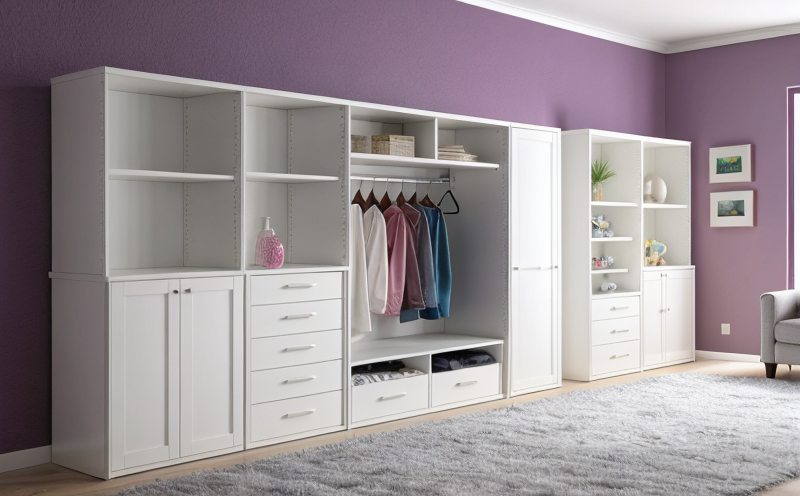JIS S 1104 Fire Safety Testing of Wooden Cabinets and Storage Units
The JIS S 1104 standard is a critical part of Japan’s fire safety framework, specifically addressing the fire resistance requirements for wooden cabinets and storage units. This service ensures that these products meet stringent fire safety standards, protecting users in potentially hazardous situations.
Fire safety testing under JIS S 1104 involves a series of rigorous procedures designed to evaluate how well wooden cabinets and storage units perform when exposed to fire. The primary objective is to assess the structural integrity, flame spread, and smoke generation properties of these products. This ensures that even in extreme conditions, users can expect reliable performance from their furniture.
The testing process typically begins with careful preparation of the sample cabinet or unit. Specimens are selected based on their dimensions and composition, ensuring they accurately represent the product being tested. Once prepared, the specimens undergo a series of tests to evaluate various aspects:
- Flame Spread: Measuring how quickly flames spread across the surface of the specimen.
- Smoke Generation: Assessing the amount of smoke produced when the material burns.
- Structural Integrity: Evaluating the cabinet's ability to maintain its shape and function under fire exposure.
The testing apparatus used includes a furnace capable of generating controlled levels of heat, which simulates real-world fire conditions. The specimen is placed in this environment for a specified duration, after which it is carefully inspected for any signs of structural failure or excessive smoke production. Compliance with JIS S 1104 requires that the cabinet maintains its integrity and minimizes smoke generation.
The results of these tests are meticulously recorded and analyzed to ensure they meet the stringent criteria set forth by the standard. A report detailing the findings is then prepared, providing comprehensive insights into the fire safety performance of the tested cabinets or storage units. This information can be invaluable for quality managers, compliance officers, R&D engineers, and procurement teams looking to ensure their products meet regulatory requirements.
The importance of JIS S 1104 testing cannot be overstated in ensuring public safety. By adhering to this standard, manufacturers can demonstrate that their products are not only aesthetically pleasing but also safe from the dangers associated with fire. This service plays a crucial role in protecting consumers and contributing to overall community safety.
Compliance with JIS S 1104 is essential for businesses operating within Japan’s market or those exporting furniture items that will be used in Japanese homes, offices, or public spaces. Failure to meet these standards could lead to product recalls, reputational damage, and legal issues. Thus, investing in this testing service is a strategic decision that can safeguard both the manufacturer's reputation and consumer safety.
In summary, JIS S 1104 fire safety testing of wooden cabinets and storage units is a vital component of ensuring public safety and regulatory compliance. By adhering to these standards, manufacturers can produce products that not only meet but exceed expectations in terms of fire resistance and structural integrity.
Customer Impact and Satisfaction
The implementation of JIS S 1104 testing directly impacts customer satisfaction by providing peace of mind regarding the safety of their furniture. Knowing that their storage units are rigorously tested to withstand fire conditions can significantly alleviate concerns about potential hazards in their homes or offices.
For quality managers and compliance officers, this service offers a clear path towards meeting regulatory requirements without compromising on product performance or aesthetics. By leveraging our expertise in JIS S 1104 testing, these professionals can ensure that their products not only meet but exceed industry standards, thereby enhancing brand reputation and consumer trust.
R&D engineers benefit from the detailed insights provided by this testing service. They gain valuable data on material performance under fire conditions, which can inform future product development efforts. This allows for continuous improvement in fire safety features, ultimately leading to better-performing products that cater to changing market demands and regulatory expectations.
Procurement teams can also leverage JIS S 1104 testing as a key criterion when selecting suppliers or materials. By ensuring their partners adhere to these stringent standards, procurement professionals contribute to the overall quality assurance process, fostering long-term partnerships based on mutual commitment to excellence.
In conclusion, the impact of JIS S 1104 fire safety testing extends beyond individual products; it shapes the broader perception of brands as leaders in public safety and compliance. This service not only enhances customer satisfaction but also strengthens business relationships through shared commitment to high standards.
Environmental and Sustainability Contributions
The JIS S 1104 fire safety testing service plays a crucial role in promoting sustainability by ensuring that wooden cabinets and storage units are designed with both performance and environmental responsibility in mind. By adhering to these stringent standards, manufacturers can minimize the risk of fires while optimizing resource use.
One key aspect of this service is the emphasis on sustainable materials. Manufacturers who opt for eco-friendly wood types not only comply with JIS S 1104 but also contribute positively to environmental conservation efforts. This includes sourcing timber responsibly and minimizing waste throughout production processes. Such practices reflect a broader commitment to sustainability, appealing to environmentally conscious consumers.
Additionally, the rigorous testing ensures that cabinets and storage units are durable enough to last longer without compromising on safety or functionality. Longer-lasting products mean fewer replacements, reducing overall demand for new resources and contributing to reduced waste in landfills. This aligns with broader global initiatives aimed at promoting circular economy principles within various industries.
From a technical standpoint, the testing process itself is designed to minimize energy consumption during trials. Advanced furnaces used in these tests operate efficiently, ensuring that only necessary heat inputs are applied without unnecessary wastage. This contributes to more sustainable laboratory practices overall.
In summary, JIS S 1104 fire safety testing supports environmental sustainability by encouraging responsible material choices and promoting durability among manufacturers. It fosters a culture of continuous improvement towards greener manufacturing processes while enhancing product performance and user trust.





